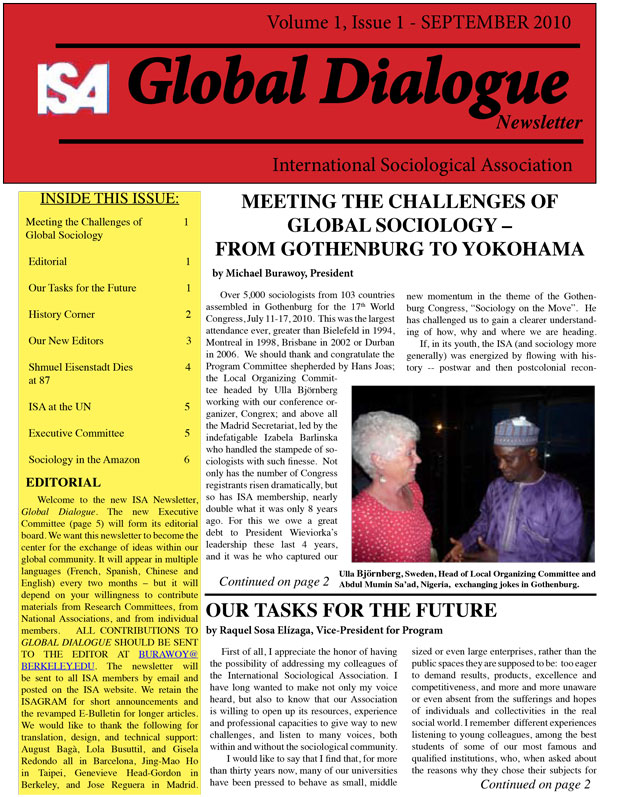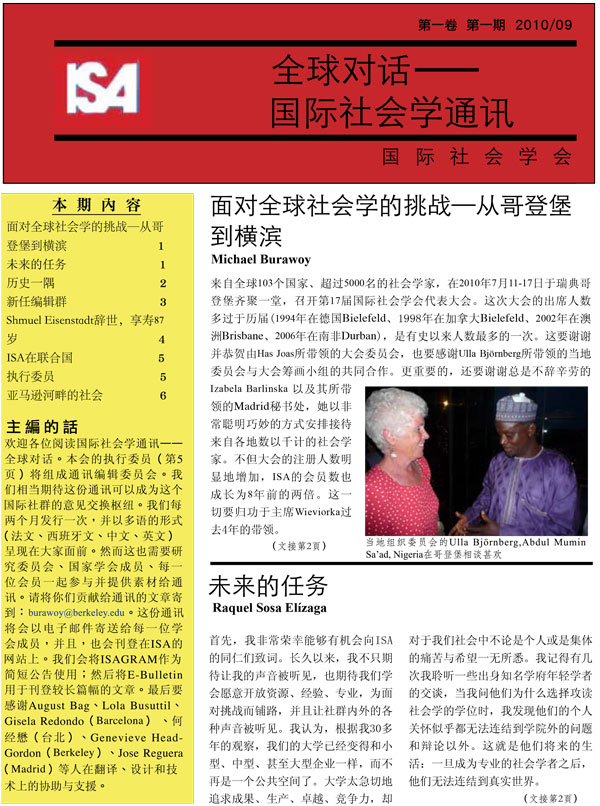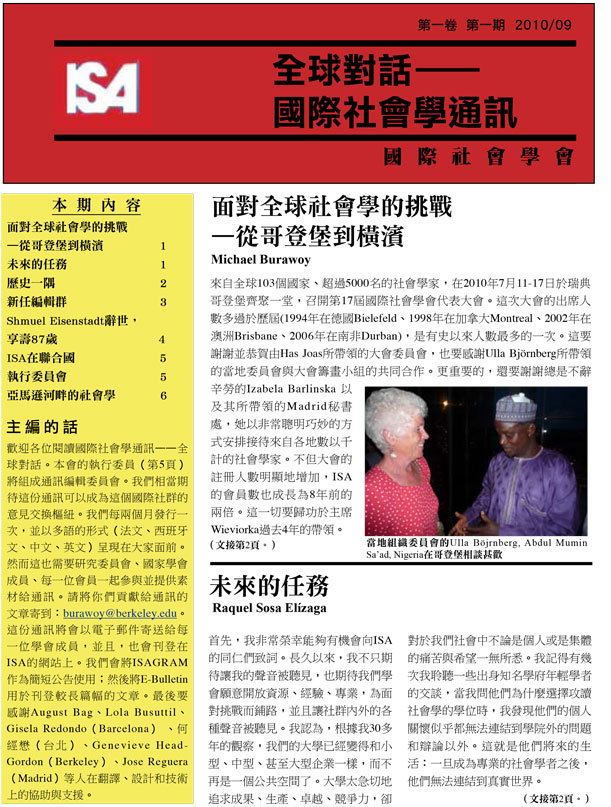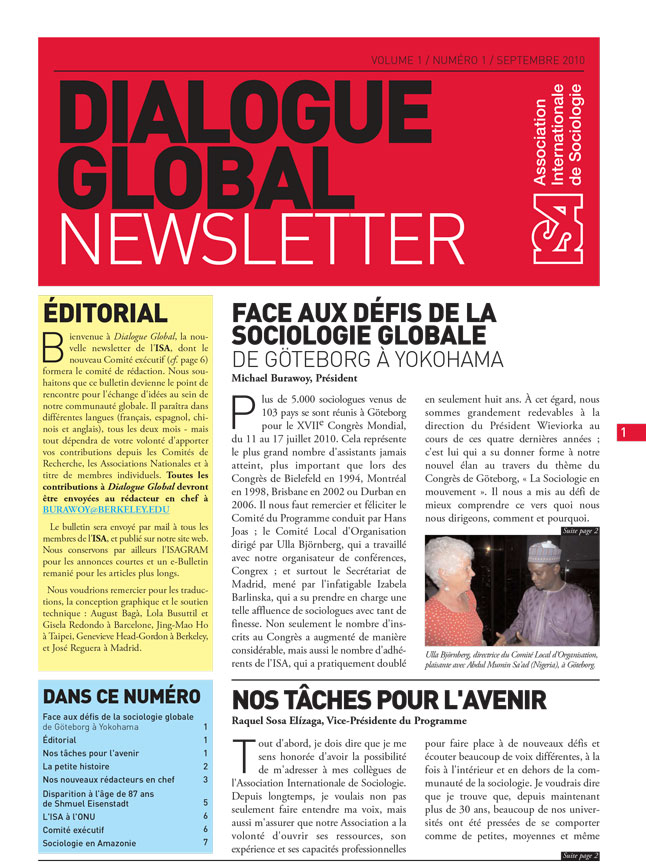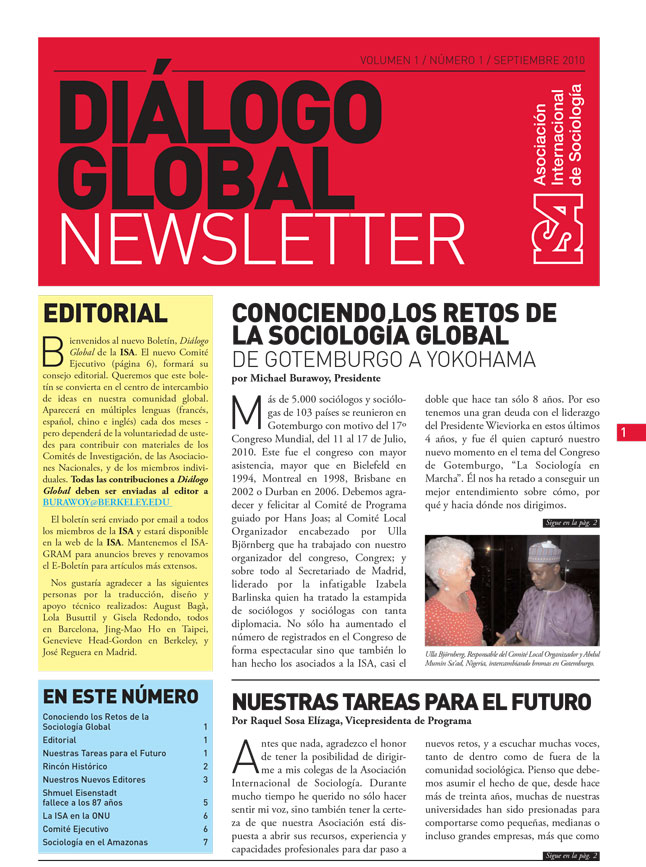Meeting the Challenge of Global Sociology – from Gothenburg to Yokohama
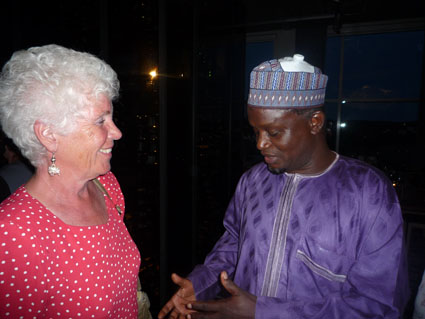
September 24, 2010
Over 5,000 sociologists from 103 countries assembled in Gothenburg for the 17th. World Congress, July 11-17, 2010. This was the largest attendance ever, greater than Bielefeld in 1994, Montreal in 1998, Brisbane in 2002 or Durban in 2006. We should thank and congratulate the Program Committee shepherded by Hans Joas; the Local Organizing Committee headed by Ulla Björnberg working with our conference organizer, Congrex; and above all the Madrid Secretariat, led by the indefatigable Izabela Barlinska who handled the stampede of sociologists with such finesse. Not only has the number of Congress registrants risen dramatically, but so has ISA membership, nearly double what it was only 8 years ago. For this we owe a great debt to President Wieviorka’s leadership these last 4 years, and it was he who captured our new momentum in the theme of the Gothenburg Congress, “Sociology on the Move”. He has challenged us to gain a clearer understanding of how, why and where we are heading.
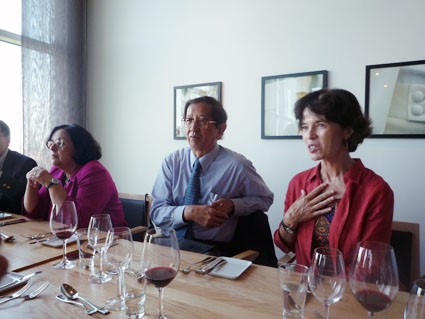
If, in its youth, the ISA (and sociology more generally) was energized by flowing with history -- postwar and then postcolonial reconstruction -- today we are energized by swimming against the stream, against the destructive collusion of market fundamentalism and new regulatory states. The critique of unregulated commodification and unrestrained bureaucratization has marked the history of sociology from the classics to the moderns, from marxism to structural functionalism, from feminism to postcolonial theory. But as the stream turns into a veritable torrent so sociology’s animating vision, the very notion of society, is threatened along with our ever-more precarious planet and its inter-connected communities.
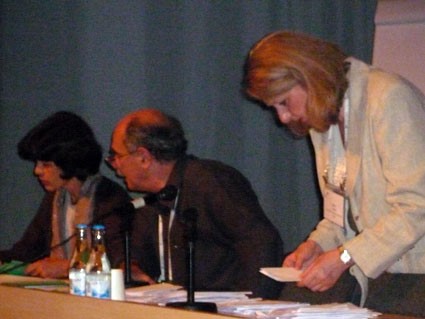
The forces arrayed against us are considerable. Universities and research establishments around the world face twin threats. On the one side the privatization and commodification of knowledge production threaten to turn scholars into appendages of university business offices and their private partners. On the other side bureaucratic regulation and mindless ranking systems are stifling exploration of new intellectual terrains and diverting energies from investigations of pressing social problems. In a number of countries the twin threats are supplemented by old-fashioned repression or new-fangled surveillance. If you are in doubt about how dire the situation is take a look at the ISA blog, “Universities in Crisis” http://www.isa-sociology.org/universities-in-crisis/.
In this context sociology is particularly vulnerable. In many places sociologists can survive only by indenturing themselves to corporate agendas or bureaucratic programs they don’t believe in. Where they have stood their ground and refused to support unlimited markets or to service regulatory states, sociologists have joined others in becoming a bastion of defense -- not only against the privatization and commodification of knowledge, but more broadly against new forms of commodifying labor, money and nature that are generating the cumulative crises of the 21st. century. Sociology is such a rallying center because it takes the standpoint of society – whether it be civil or uncivil, stable or precarious -- against excessive marketization and imperious statism. And this is a battle that can no longer be confined to national terrains. It requires us to forge an active global sociological community, and simultaneously build constituencies beyond the academy. That is why the ISA is ever more important, and one reason why it attracts ever more numbers.
Meeting this challenge will not be easy, but we can make headway by building on the considerable accomplishments of the ISA. Concretely, my program erects a global sociology on three legs, three Ms – Media, Membership and Message. We will make creative use of electronic media, to build a more inclusive and interactive membership, while advancing a global message aimed at our own community and beyond. These projects will involve the close collaboration of the new Vice-President for Publications, Jennifer Platt, who takes over from Devorah Kalekin-Fishman, and Robert Van Krieken, the new Vice President for Finance and Membership, who takes over from Jan Fritz.
Let me start with the first “M” – electronic media. Here I propose to pursue 6 initiatives over the next 4 years.
- A Newsletter. I will start an electronic newsletter, called Global Dialogue. You are reading the first issue. Global Dialogue will include regular reports from the President and Vice-Presidents. Members, too, will have a forum to air their activities as well as make suggestions and criticisms. The Newsletter should be a vehicle for two-way communication between the Executive Committee and members from around the world. It will be published in multiple languages under the direction of regional editors.
- The E-Bulletin. Under the continuing editorship of Vineeta Sinha we will be re-organizing our electronic journal, the E-Bulletin, giving it a new name, making it widely accessible and far more visible, having its own website, while also widening participation in its production.
- Universities in Crisis. We need to develop a better understanding of the rapidly changing research and teaching context within which we conduct our sociology. To this end, I will be soliciting contributions and give more prominence to the blog, Universities in Crisis, which analyzes academic life in all corners of the earth. http://www.isa-sociology.org/universities-in-crisis/.
- Translations. A perennial problem in our association involves the languages that divide us. We have discussed this on multiple occasions, and we will continue to do so. One proposal I and others have put forward is to make a concerted effort to translate important articles from around the world into English, making them widely available to our membership. We also need to find ways of making International Sociology and Current Sociology accessible to those who teach and write in languages other than English.
- Portraits of Sociology. Over the years the diversity of ISA members has grown in many dimensions. To gain an appreciation of that diversity and better understand what doing sociology means in different contexts, I would like to create a video collection to be posted on our website of the everyday life of sociologists – famous and not -- from different countries.
- Global Sociology, Live! I will start a regular program on global issues with short lectures and/or interviews with sociologists from around the world. It will be streamed as a video and audio recording, and posted on YouTube with the goal of fostering an international audience for a live broadcast of global sociology.
In all these ways the media actually helps create the membership, my second “M”. Electronic media can potentially bring us together in new ways, allowing the vast majority of sociologists around the world, many of whom cannot afford to come to world forums and congresses, to participate actively in our community. Electronic media can also fill the hiatus between congresses with an ongoing virtual global conversation. In this way we can lay the foundations of a broader public sphere, internal to our organization but also connecting us to the world beyond.
But electronic media are not by themselves sufficient. We need an engaged, empowered membership that spans the globe. Building such a membership requires complementing virtual communication with face-to-face interaction. Here the ISA has served us well. We already have a very active complex of Research Committees, many meeting on a regular basis, along with National Associations that also have their own meetings, as well as Regional Associations of Latin America, Europe, Asia-Pacific, Africa, Turkic Countries, as well as French and Lusophone Speaking Associations, and more. In addition, the ISA supports two or three Regional Workshops every year.
Building a dynamic global membership also means catering better to Junior Sociologists, particularly the growing ranks of young sociologists in the Global South. This is not easy since Junior Sociologists are pre-occupied with building their careers, and have less time and more limited financial resources than their senior counterparts. But they are our future, and they are over a fifth of our membership. We already have the annual PhD laboratories introduced by Alberto Martinelli as well as the essay competition for Junior Sociologists we hold every four years. I would like to develop other venues and occasions for Junior Sociologists to meet, which would help them integrate into the ISA. I have appointed a Committee, headed by Emma Porio, to examine such possibilities and wherever I travel I will try to hold meetings with early career sociologists.
The two wings of our association – the Research Coordinating Committee representing 55 Research Committees, 3 Thematic Groups, and 3 Working Groups; and the National Association Liaison Committee representing 57 National Associations – each have their own midterm conferences. Here we turn from media and membership to the message. How can we combine our organizational structure with new media to promote the messages of global sociology? We have already made great strides in this direction. Arturo Rodriguez, the former Vice-President for Research, engineered a new departure in creating the first ISA Forum, held in Barcelona in 2008. Margaret Abraham, our new Vice-President for Research will be responsible for the next Forum to be held in 2012. A request for bids for a host country has been widely distributed. In addition to bringing Research Committees together, the Forum’s goal is to bring professional sociology to bear on the unique and escalating problems of our time, consolidating links to constituencies beyond the academy.
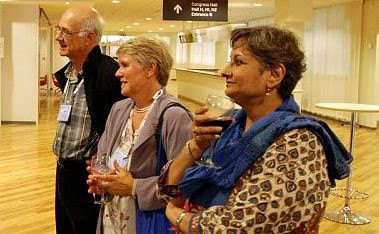
The Forum’s message dovetails with the idea of public sociologies that has captured the imagination of many, generating vigorous debate within our community as to who we are and what we are about. There are now over 20 symposia on public sociology published in different journals around the world – sociologists examining their own field in order to better examine issues of local, national and global concern. However, we cannot think of public sociology outside its relation to professional, critical and policy sociologies. Each type of sociology depends upon and contributes to the other three, even as they crystallize into very different national hierarchies, very different articulations of the four sociologies. Notwithstanding the considerable divergences in national sociologies, there are also convergences. As a result of international rating systems, world rankings of universities, the hegemony of the English language in publishing, and global competition for students, sociologists are being driven into opposed camps -- those oriented to international networks and those grounded in their immediate surroundings, what we have called cosmopolitans and locals.
We must contest such centrifugal pressures and bridge the many geopolitical divides by strengthening the fiber of our global sociological community. We should not weave it from above from the cloth of a single hegemonic sociology, but stitch it together from below through National Associations, Research Committees or other vehicles that recognize and respect the rich diversity of sociologies. Across the globe there are many institutes, embedded in local communities and with long traditions of practicing public sociology, such as SWOP (Society, Work, and Development Institute, University of Witwatersrand, South Africa) , CREA (Centre de Recerca Social i Educativa, University of Barcelona), and CENEDIC (Center for the Study of Citizenship Rights, University of Sao Paulo). These institutes all manage to embed their public engagement in serious research programs, subjecting sociology to continual critique and often undertaking principled interventions in the policy field. Another project I propose is to make the work of these and other such institutes better known, and connecting them to each other in a global network.
Finally, the National Association Liaison Committee sponsors its own conference every four years. Tina Uys, our new Vice-President for National Associations, will be organizing the next one in 2013. The last one was held at Academia Sinica in Taiwan in 2009. It was attended by representatives of 43 countries, and devoted to examining the inequalities and dominations that divide us, that is to apply sociology to ourselves. This exciting conference examined such issues as linguistic domination, unequal material and social resources, privatization of research, and the need to develop alternative theoretical frameworks. The 53 papers have been published in three regional volumes and can be found on line at http://www.ios.sinica.edu.tw/cna/index.php.
Raquel Sosa, our new Vice-President for Program, and I would like to use the Taipei discussions as a platform for the 2014 Congress in Yokohama -- Facing an Unequal World: Challenges for a Global Sociology. We will move from the divisions we face within our own community to the staggering inequalities on the world stage. It is not just a matter of recording their multiple dimensions – though that is important in itself. We also need to understand the underlying processes that generate these inequalities, specifically the creation of new forms of exploiting and also excluding labor, the devastating consequences of new financial systems, the destruction of the environment, the privatization of knowledge to name but a few. Explanation is not enough, we can learn much from exploring efforts to reverse these inequalities such as micro-experiments in eco-communities to systems of cooperatives such as Mondragon to the Tobin tax on financial transactions. To every critique we must supply constructive and concrete alternatives.
Many of these proposals were already “on the move” in Gothenburg. We plan to give them coordinated and focused attention in Yokohama. In the meantime a challenging program lies ahead whose progress will be mapped out in the pages of this Newsletter. Most of all, we are counting on your responses, both critical and supportive, to guide and stimulate the Association’s trajectory over the next four years.
Michael Burawoy, University of California, Berkeley, USA

